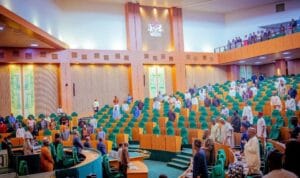What It Means for Kogi Central and Nigerian Democracy
A Big Win for Natasha, a Bigger Message for Nigerians
For months, Senator Natasha Akpoti-Uduaghan’s name has made headlines—some supportive, others controversial. But on June 19, 2025, something big happened.
The Federal High Court in Abuja ruled that her suspension from the Senate was not only harsh but unconstitutional. Justice Binta Nyako didn’t hold back. She declared that the Senate acted outside its powers by suspending Natasha for six months—effectively silencing her and denying her people in Kogi Central a voice in national matters.
Let’s unpack this ruling and why it’s not just a personal victory for Natasha—but a statement about democracy, representation, and the rule of law in Nigeria.
Why Was Natasha Suspended in the First Place?
Early 2025, the Senate suspended Senator Natasha over some comments she made during a heated session. Though the full details weren’t made public, many speculated it was tied to her bold statements about corruption, violence, and alleged threats to her life involving top political figures.
Some saw her as a whistleblower. Others felt she crossed a line. But regardless of opinion, one thing was clear: suspending an elected senator for half a year was extreme.
In fact, during that time, Kogi Central had no representation in the Senate. That’s over 180 days of legislative silence for her people.

Ruling BreakdownIn
Justice Binta Nyako made it clear—discipline is allowed, but not at the cost of democracy.
She pointed out two major issues:
- Violation of Senate Standing Rules – The process used to suspend Natasha didn’t follow internal procedures.
- Constitutional Breach – Section 111 of the Nigerian Constitution guarantees that all constituencies must have representation in the Senate. Her suspension broke that rule.
She ordered the Senate to immediately reinstate Natasha. No debates. No delays.
⚖️ What the Judge Said (In Summary):
“While the Senate has powers to maintain order and discipline, it must not use those powers to deny citizens their right to representation.”
— Justice Binta Nyako, Federal High Court
Implications for Kogi Central and Other Lawmakers
This isn’t just about Natasha.
It’s about every Nigerian community that sends someone to the Senate. If one senator can be sidelined for six months, then technically, any constituency could lose its voice without a by-election.
Imagine a law affecting farmers or traders being passed while your senator—your only voice—is silenced. That’s exactly what happened to the people of Okene, Adavi, Okehi, and other local governments under Kogi Central.
Now, with the court’s ruling, those citizens can breathe again. Natasha is expected to return and continue her work in the Senate.
But It Wasn’t All Court Also Fined Natasha
Even though she won the case, Natasha didn’t leave the courtroom scot-free.
The court found that she violated a gag order by speaking publicly about the same case that was ongoing. For that, she was:
- Fined an undisclosed amount
- Ordered to publish a public apology in two national newspapers
This part of the ruling shows that no one is above the law, not even a sitting senator.
It also sends a message: You can fight for your rights, but you still have to respect the court’s process.
A Tense Political Atmosphere
Many believe Natasha’s bold political style is at the root of her troubles.
She’s vocal. She’s fearless. And she’s not afraid to call out what she sees as corruption or abuse of power.
For instance, she had earlier accused Senate President Godswill Akpabio and former Kogi Governor Yahaya Bello of plotting an assassination against her. These are strong claims—and they didn’t go unnoticed.
Some of her supporters argue that the suspension and legal pressure are forms of political retaliation.
But others believe she may have gone too far in her statements.
Up Next in Part 2…
We’ll look into:
- The ₦50 million bail granted to Natasha in her ongoing criminal case.
- What the FG is accusing her of—and why.
- What Nigerians are saying about her legal battles and political career.
- And how all this may shape her future as a public figure.
FAQs
Q: Why was Senator Natasha Akpoti-Uduaghan suspended from the Senate?
A: She was suspended over comments made during a Senate session, believed to involve sensitive political accusations.
Q: What did the court say about the suspension?
A: The Federal High Court ruled it was unconstitutional and ordered the Senate to reinstate her.
Q: Did the court penalize her too?
A: Yes. She was fined and asked to apologize publicly for breaching a gag order.
Q: When did the court give this ruling?
A: The ruling was delivered on June 19, 2025, by Justice Binta Nyako in Abuja.
Q: What happens next?
A: The Senate is expected to reinstate her. Meanwhile, she’s still facing trial in a separate
Senator Natasha’s Legal Storm – Bail Granted, Trial Looms, and More Questions Than Answers
While many were still celebrating Senator Natasha Akpoti-Uduaghan’s reinstatement ruling, another court in Abuja had its own drama.
This time, it wasn’t about suspension. It was criminal.
The Federal Government is taking Natasha to court over serious allegations—claiming she made false and damaging statements about Senate President Godswill Akpabio and former Kogi Governor Yahaya Bello.
Specifically, the FG alleges that Natasha falsely accused both men of conspiring to assassinate her.
In a country where political violence is sadly not new, such an accusation isn’t something the government would ignore. And now, it’s landed Natasha in another legal storm.
The Bail Hearing: What the Court Decided
On June 19, 2025, Justice Chizoba Orji of the FCT High Court delivered her judgment on Natasha’s bail application.
⚖️ The Verdict:
- Natasha was granted bail.
- The court fixed her bail at ₦50 million.
- She must present one surety who:
- Has property within Abuja
- Is of good character
That’s no small requirement. But the judge was firm—there was no legal reason to deny her bail.
She noted that Natasha had not attempted to run, had attended previous court dates, and had shown she was ready to face trial.
What the Law Says About Her Rights
This decision wasn’t just a show of mercy. It was grounded in the law.
The judge cited:
- Section 36 of the Nigerian Constitution (as amended), which says every citizen is innocent until proven guilty.
- Sections 163 and 165 of the Administration of Criminal Justice Act (ACJA), 2015, which guide bail conditions in criminal cases.
So even though the accusations are serious, the law demands fairness.
🧾 Legal Takeaway:
“You don’t punish someone before they’ve been found guilty in court. That’s not justice. That’s mob rule.”
The FG’s Push for Detention Was Denied
Interestingly, the Federal Government tried to push for her to be kept in custody while the trial continued.
But Justice Orji rejected that.
She emphasized that unless there is evidence the accused will run away, tamper with witnesses, or interfere with evidence, there’s no basis for detention.
That decision drew mixed reactions.
Some hailed it as fair and balanced. Others—especially critics of Natasha—felt she was getting off too easy.
The Bigger Picture: Is This a Witch Hunt or Due Process?
That’s the question many Nigerians are asking.
Some of Natasha’s supporters believe this is a political witch hunt—a way to punish her for being outspoken, especially against people in power like Akpabio and Yahaya Bello.
They argue that in a real democracy, whistleblowers should be protected, not prosecuted.
But the Federal Government insists this is about truth, responsibility, and the law.
After all, if someone publicly accuses the Senate President of attempted assassination, there must be evidence—or consequences.
Public Reaction: The Streets Are Talking
On social media, the story is trending.
Many Nigerians are divided:
- Some see Natasha as a symbol of female political courage.
- Others believe she is reckless and attention-seeking.
But one thing’s clear—people are watching closely.
Her face is on blogs, news sites, radio shows, and WhatsApp groups.
Supporters are already using hashtags like #JusticeForNatasha and #ReinstateTheVoice, calling her brave and fearless.
Critics are calling for more responsible leadership and less drama.
What Happens Next: Trial Date Set
Mark your calendars.
The court has adjourned Natasha’s case to September 23, 2025 for trial.
This gives both sides time to prepare. But also, it gives Nigerians time to reflect:
- Will Natasha be cleared?
- Will her career survive the back-to-back court cases?
- Will the Senate welcome her back—or make life harder?
Only time will tell.
Why This Case Matters to All Nigerians
Whether you like Senator Natasha or not, this case touches on three powerful issues:
- Freedom of Speech – Can you speak against the powerful without fear?
- Rule of Law – Will justice be applied fairly, regardless of political rank?
- Women in Politics – How much room is there for women who speak up boldly?
If Nigeria truly wants to build a fairer democracy, then this case must be watched—not just for gossip, but for justice.
Defining Moment for Senator Natasha
From courtroom victories to criminal charges, Natasha Akpoti-Uduaghan is at the center of one of Nigeria’s most dramatic political-legal sagas in recent memory.
Reinstated by one court. On trial in another. Fined. Freed on bail. And now waiting for her day in court again.
Whatever the outcome, her story is already shaping how we talk about power, politics, and justice in Nigeria today.
FAQs
Q: Why is the Federal Government suing Senator Natasha?
A: The FG says she falsely accused Senate President Akpabio and ex-Governor Bello of plotting to assassinate her.
Q: What was the bail condition set by the court?
A: Bail was set at ₦50 million with one surety who owns property in Abuja and is of good character.
Q: Did the court deny FG’s request to detain her?
A: Yes. The judge ruled there was no legal reason to keep her in custody while awaiting trial.
Q: When will the trial start?
A: The case has been adjourned to September 23, 2025.
Q: What are the possible outcomes for Natasha?
A: She could be cleared, fined again, or even convicted, depending on the evidence and court rulings.




